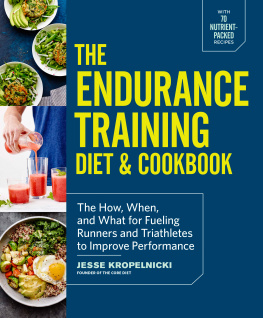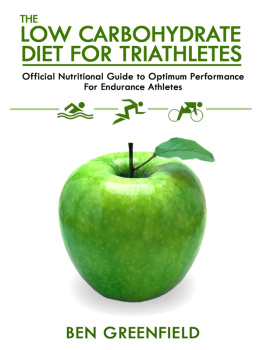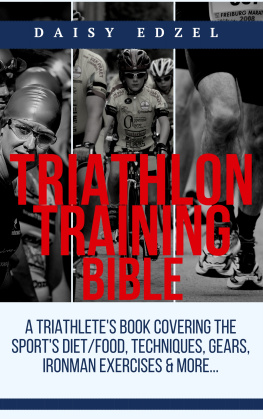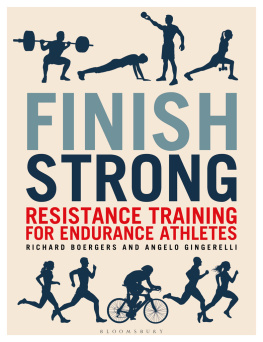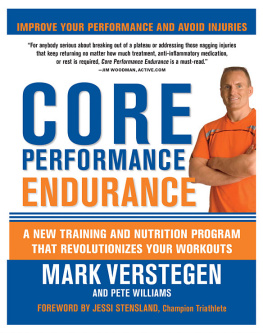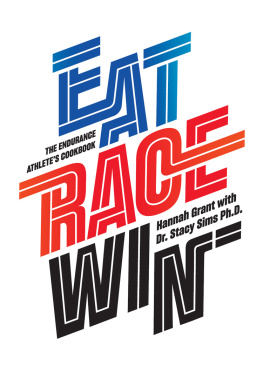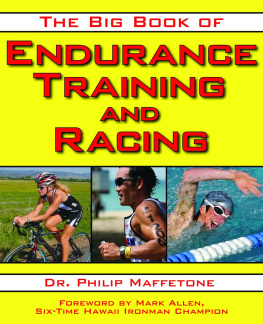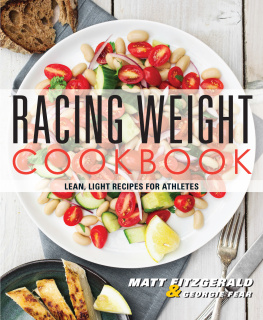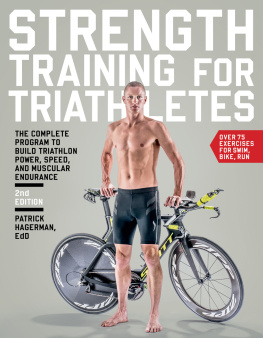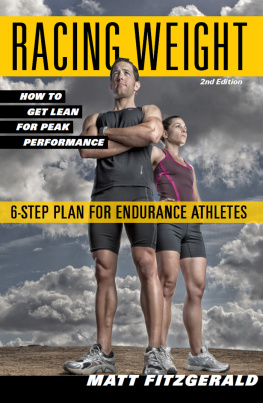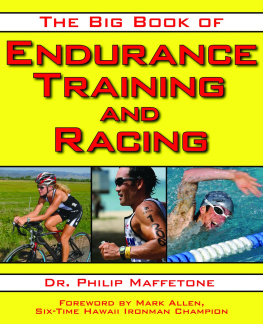ACKNOWLEDGMENTS
WRITING A BOOK is way more difficult and complex than it sounds! Thats what I have learned throughout the process of creating this book. However, there were many folks who made the process a lot easier than it would have been without their help.
First off, none of what I do would be possible without the support of my amazing wife, Chrissie, and our kids, Colin and Stella. Long days and late nights dont happen by themselves, and Im grateful for my amazing support crew back at home.
To my second family, the Core Diet and QT2 staff, who help support my vision of cutting-edge nutrition and endurance-sports-preparation approaches on a daily basis. These guys and girls work hard because they love what we do, and that passion is what makes the wheels turn and lets us help athletes as well as we are able. Specific thanks to Tim Snow for helping with the actual assembly of this book!
To my third family, the professional athletes I coach; these individuals challenge me to come up with better, more efficient, and cutting-edge nutrition and training approaches every single day. Much of the information in this book was developed as a result of them challenging me daily and my response to deliver real solutions that work.
Thank you to Penguin Random House and specifically my editor, Ashley Meyer, who helped guide me throughout this entire process. She not only created the spark for this book up front, but also helped guide a total novice to create a piece of work that resembles that of a seasoned author. Im proud of it, Ashley! Thank you! And to the rest of the Harmony Books team: Diana Baroni, Tammy Blake, Sean Civale, Kelley Galbreath, Stephanie Huntwork, Sonia Persad, Patricia Shaw, Kim Tyner, and Aaron Wehner.
Although the concepts in this book are ones Ive developed over many years, I had the privilege of working with Shirley Fan to bring them to life. Her dynamic and fresh recipes do just that, and tasting many of her dishes during the photo shoot for the book really had me excited to get this book into the hands of athletes.
Last, I want to thank the athletes featured in the photos of the book: Linsey Corbin, Pedro Gomes, Dan Moore, and Caitlin Snow. Thank you for being part of this project!
ABOUT THE AUTHOR
JESSE KROPELNICKI is a veteran professional triathlon coach and the founder of QT2 Systems brand of endurance sports preparation businesses, which includes QT2 Systems, the Core Diet, OutRival Racing, and the Run Formula. His roster of clients includes IRONMAN champions and past USAT national team athletes. He lives with his wife and their two kids in Scituate, Massachusetts.

DO YOU WANT to get an edge in your half marathon, marathon, triathlon, and/or IRONMAN racing? So many athletes are striving to gain a margin of increased performance that allows them to reach their goals, but carefully crafting a workout schedule alone wont cut itfueling properly is the key! Through the nutrition company I founded, I have worked with thousands of athletes and can tell you that the longer the race distance becomes, the more nutrition can actually limit results. Id bet that most athletes who are unhappy with their race performances in races longer than 3 hours had inadequate nutrition as their primary limiter. People are learning the hard way that diet is more important than ever. To me, this is a sad fact, since it is so easy to address. I never like to see athletes who have made sacrifices in training, taking time away from their families and friends, have nutrition deficits be what holds them back on race day.
One big reason why improving your diet as it pertains to training and racing positively affects performance is that your body is better positioned to absorb training loads and handle additional stresses. The athlete who can apply and absorb the most training stress over the long haul makes the most progress. Good nutrition, day to day, in what and when you eat will help your body handle the increasing stressors of training so that on race day youll be stronger than ever. The beginner athlete will benefit from learning the proper fundamentals right at the start, which sets the ideal nutritional stage for performance. Professional or elite athletes can use nutrition to gain that much-needed, extremely valuable 1% improvementa seemingly small margin that can be the only thing keeping them from winning. So often I see athletes pushing for that margin with harder, longer training sessions, which tax the body immensely. But sometimes, simple dietary changes can help someone achieve that 1% without physical cost, and instead with an improved state of being that comes with eating well and recovering well. I recently worked with one top-level professional triathlete on race fueling, aiming to manage her body composition properly throughout the year, while also understanding her sweat rates and her specific sodium and fluid needs. A big part of the process was simply practicing good nutrition more intensely. She went from barely finishing her races to outstanding performance at the world championship in just 6 months! If thats not proof of how proper nutrition can help you, Im not sure what is.
A HEALTHY LIFESTYLE AND OPTIMIZATION PHASES
The Endurance Training Diet and Cookbook promotes the philosophy that athletes should follow and maintain a lifestyle of healthy eating all of the time, and then augment their diets during training and racing seasons to support the vigorous work that they put their bodies through. The principles here are significant to the optimization of an athletes body composition and will affect his or her performance, both directly and indirectly. But, much more important, these principles lead to healthier day-to-day living and well-being, as the foods I encourage you to eat will give you more energy and cause you to feel better in general.
A HEALTHY LIFESTYLE
Most athletes know that while a training program is necessary to prepare for any endurance racegradually building up stamina and strength in order to finish strong on race dayhaving a base of fitness is also essential. Your marathon plan, for example, may list a run of 6 miles on day one, but its far, far better if that isnt your first run of that distance! The body needs time to develop aptitude for such an activity, and so the months before that 6-mile run should include many runs of varying lengths, including a few 6-milers.
When it comes to nutrition, you should treat your body the same way. Totally changing your diet right as you begin training could result in some uncomfortable transitions (such as tummy aches or other unsettled digestive results). But, more important, you need a base! As you start ramping up your workouts, your body will reach into itself, tapping in to stores of vitamins and minerals for the ability to push through and recover. Youll do well to stock your body with nutrients in advancein fact, you should focus all of your attention on eating nutrient-dense foods as an ongoing lifestyle.
The nutrient-dense foods that I have the athletes I work with reach for day after dayand that the recipes in the back of the book are based onare fish, lean meats, lean dairy, fruits, vegetables, nuts, seeds, and legumes. Throughout the book, Ill refer to these as our core foods, since theyre the foundation of all we eat. These foods provide us with a complete macronutrient (proteins, carbohydrates, and fats) profile, and also set the basis for meeting our micronutrient (vitamins and minerals) needs (see ). Furthermore, with some minor modifications discussed herein, a diet based on these foods is sustainable. It isnt so limited that its hard to live life; youll likely be able to find something on any restaurant menu that fits the bill. We dont always have total control over our dietary options, but these guidelines are helpful for making smart choices wherever you are.
Next page
